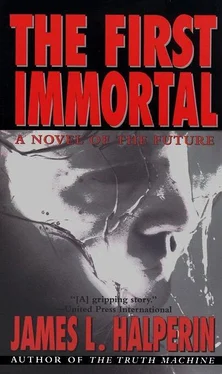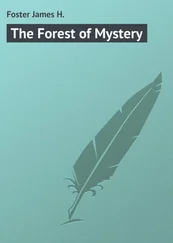Joe Marchetti, the Wildcat quarterback, called for the snap, and Gary stuck the ball perfectly into the guy’s hands. He just needed to hold fatso off for three seconds. Three lousy seconds. Gary tried to imagine the lineman as Ben instead. That always seemed to work, even when he felt as depleted as he did right now. With every ounce of strength he could muster, grunting loudly, he drove into the guy’s midsection. But his right foot couldn’t get the traction he’d expected, and his inertia deviated slightly off center. Cadbury was going to blow past him.
Shit!
Impetuously, almost as instinct, he extended his left leg and hooked the lineman’s ankle, tripping him before he could reach Marchetti. Cadbury toppled crosswise, dropping his full weight onto Gary’s leg. Both boys heard a loud snap, like a broom handle breaking across someone’s knee.
Gary watched as Marchetti sailed a perfect spiral toward a wide-open man on the six-yard line… who dropped it.
Then Gary passed out from the pain.
When Gary awakened at the Peter Bent Brigham Hospital that evening, surrounded by his entire family, including Ben, Marge grasped his hand and described how the Wildcats had scored on the next play, making the playoffs.
Without him, he thought.
Then she told him that he’d suffered multiple fractures from hip to mid-shin. The doctors had estimated that he would remain in traction for ten days and in a cast for seven months, and that when the cast was finally removed, his left leg would be half an inch shorter than his right, if he was lucky. He would never play football again, or serve in the armed forces, or walk without a limp.
Through pain now barely contained by narcotics, Gary silently told himself that his dad would never have been so careless. What a goddamn loser he was.
He looked at his father, and found no argument in his eyes.
July 1, 1971
The main auditorium of New York City’s Americana Hotel was a vast, high-ceilinged space with white walls and sweeping, angular lines, its acoustics designed more for impact than clarity; one of those monuments to egoism that seemed to proclaim that no trivial utterance should ever resound from its scaffold. The chairs were oversized, plush, and comfortable.
Ben sat himself in the back just as Professor Carl Epstein began, “For the great majority of our cases, we doctors are thoroughly and worthlessly irrelevant…”
Over the past decade, Epstein had evolved into a legendary figure in the field of medical education, an iconoclast whose views did not merely challenge, but demolished, conventional wisdom. He had written over seven hundred published articles, authored eleven books—two best-sellers, both controversial—and for two years had hosted a weekly medical ethics program on National Public Television.
Physicians were used to playing the role of God’s stand-in; they were not known for self-doubt. Were it not for his talents as a lecturer, Epstein’s commentary would probably not have received much notice from this reactionary field of science. Yet today roughly a thousand persons, all medical practitioners, willingly ingested his speech, titled, “The Downside of Hope.”
Ben recalled with pride and amusement that, but for his own heroics some thirty years earlier, the renowned instructor from the Johns Hopkins School of Medicine might instead have nourished fish at the bottom of the Pacific. The two men had kept in touch since the war, but had last seen one another three years ago at a New England Medical Association conference. That morning Ben, who still refused to set foot on an airplane, had made the four-hour journey by car for the sole purpose of matching wits over dinner with his longtime friend.
“The overwhelming majority of illnesses and injuries heal themselves,” Epstein continued in his trademark conversational style, never referring to notes, “and often we do nothing to speed the process. In fact I estimate that about one-fifth of medicines and surgeries prescribed actually do more harm than good.
“And yet I can prove statistically that our profession adds at least a decade to the average human life span, while improving quality-of-life significantly. How can these two facts be reconciled? Simply because of those rare instances in nearly every person’s life when today’s medical science makes the difference between complete recovery and permanent disability. Or life and death.
“As some of you know, during the Second World War I was the only medical officer at a Japanese prisoner-of-war camp. To cope with the workload, I managed to press-gang my friend, a teenage fire controller third class—now an acclaimed gastroenterologist, by the way—into assisting with my duties. As if I didn’t already owe him enough for having saved my life. But that’s another story.”
Ben smiled, surprised to hear himself mentioned, especially since Epstein had never actually thanked him.
For fifty-five minutes the professor regaled the room with tales of their experiences nursing fellow prisoners without medicines, and described their informal study of placebos. The audience was engrossed; there was barely a cough or a murmur.
“A single human brain,” he concluded, “is many times more complex than every telephone network and computer on earth combined. Its power to heal the body is well-documented, although still far beyond our comprehension. Yet it’s this very talent of the mind that permits quackery of the worst sort; quackery that doesn’t merely deprive patients of their money, quackery that seduces them to abandon other treatments that could save or prolong their lives. Who among us has not heard of miracle cures and spontaneous remissions; patients given up for dead who now bounce around, healthy as horses, spreading their stories of hope like a freshly imported, antibiotic-resistant substrain of syphilis?”
Epstein went on to describe case histories of patients seduced into harmful or worthless treatments after discovering that those same regimens had “proven successful” on others. “Of course,” he added, “it’s doubtful that these so-called successful treatments had anything to do with the cure. As I said, faith and hope are powerful and enticing medicines.
“Doctors are educated as scientists, trained to resist wishful thinking in favor of objective detachment. Yet it must also be our job to understand the prescientific, the human element of healing.
“I knew one doctor, a young woman of considerable medical talent, a gifted scientist with a keen mind. Tragically, she was diagnosed with a stage T-2 breast cancer last year. Her physician urged her to undergo radical surgery immediately. ‘It’s only a breast,’ he explained to her with detached objectivity, ‘not an arm or leg. With the surgery, your odds of survival are better than seventy percent. There’s nothing to think about. I can operate tomorrow.’ It never occurred to him that her disease was not the only foe; that there might be a far more implacable enemy.
“Her husband was a caring, optimistic fellow whose sister, a Christian Scientist, had defeated a similar cancer six years earlier. I believe the man loved his wife and genuinely had her interests at heart. ‘My sister simply prayed her tumors away, honey, and so can you,’ he cajoled her. ‘If you have faith, this surgery is completely unnecessary. Why put yourself through it? Don’t you know God decides what’s best for us?’
“Now try to imagine yourself in her situation. You are a rational scientist, but your judgment is severely clouded by the distress of a terrible illness, and you have no strength to argue. Your life means far less to you than it would if you felt well. And you’re torn by conflicting counsel—on the one side a doctor who considers you as a ‘case,’ just another adenocarcinoma, and on the other a loving spouse who thinks about your welfare day and night. In such a predicament, mightn’t you blindly accept the opinion of your sweetheart, which is to say, your emotional anchor over that of an impartial expert? You think not; you think logic would prevail, but until you experience the situation yourself, just how sure can you really be? The understandable need to please those who would care for us in what may be our final days can overwhelm the most objective thinker.
Читать дальше












